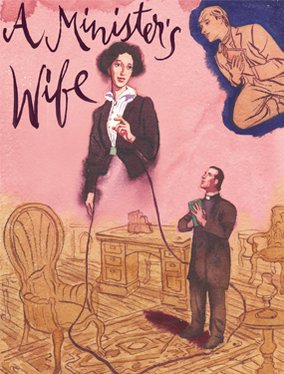
It's unlikely this musical version of George Bernard Shaw's Candida will achieve the audience and critical acclaim of My Fair Lady, which was based on Shaw's Pygmalion. Lacking those sparkling, audience-friendly songs that have become standards, A Minister's Wife has an often dissonant, very contemporary and sporadically melodic score by composer Joshua Schmidt (Adding Machine) that weaves complex chamber music throughout the story. Jan Levy Tranen's lyrics reflect the wit and romance of the Shavian play.
Conceived and directed by Michael Halberstam with Austin Pendleton's minimalized book, the play runs 95 minutes and has moved from a socio-economic romance to a musical romance with laughs. Marc Kudisch plays the Rev. James Morrell, a popular socialist minister with audacious pomposity and verbosity. He is waiting for his wife, Candida (Kate Fry), to arrive. He depends on the practical Candida to provide organization and security in his self-important life.
When Candida arrives, she brings along Eugene Marchbanks (Bobby Steggert), a teen-aged poet who is besotted with her. Marchbanks feels she is a goddess, not suited for the mundane life as a minister's wife and its household duties. She is infatuated with his admiration since her husband is so involved with himself, his church and his socialist speeches. The boyishly earnest Marchbanks finally confronts Morrell and challenges him for Candida's love. She is forced to choose which of the two is the weaker and needs her the most. They each state their cases and Candida, with lovely musicality, chooses her husband as the neediest, not necessarily the one she loves.
While Fry, Kudisch, and Steggert sing with robust potency, there is a lack of believability. Kudisch is spot-on as the pretentious minister who is rudderless without his wife's support. Bobby Steggert, while a talented actor and a singer with broad range, looks like an ardent, still-growing youngster. It is inconceivable to think that Fry's mature, sensible, far from dreamy-eyed Candida, would let his fantasies rise to such expectations.
The capable five-person cast also includes Morrell's devoted and infatuated secretary, Prossy (Liz Baltes). Drew Gehling plays the Rev. Alexander Mill, called Lexy, a young curate who assists Morrell. Halberstam effectively stages their conversations on Allen Moyer's inviting set, an 1898 English study, comfortable with books and papers. The four onstage musicians are positioned behind a scrim.
Who is missed in this adaptation is Candida's capitalistic, unethical father, who provided the necessary political and economic punch in Shaw's original. Pendleton's editing of the narrative trivializes it into a love story with laughs. Adding the complex, intriguing music narrows its audience appeal.
The upside is the delightfully smart Shavian dialogue like, "When love is spoken, love is returned/Love unspoken is love unearned." Then again, Shaw placed the emotion there from the start, even without the addition of music.
